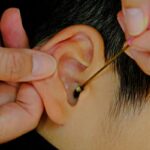Have you noticed yourself turning up the TV more than usual or feeling like others are constantly mumbling? You’re not alone. These are often early signs of hearing loss. While some degree of hearing decline is a natural part of ageing, lifestyle habits can influence how quickly it develops, or how well it can be managed.
Even if you’re hearing still seems fine, it’s worth protecting. Hearing plays a huge role not just in how we experience the world, but in how we connect with others. And when it starts to fade, the effects often reach far beyond just missing a few words here and there, it can significantly impact mental health and emotional wellbeing.
In this blog, we explore the relationship between hearing loss and mental health and offer guidance on how to seek support if you’re struggling.
The emotional strain of hearing loss
Living with hearing loss can be frustrating, particularly when it starts to affect daily communication. Asking others to repeat themselves or missing out on meaningful conversations can be disheartening. Over time, these challenges may lead to feelings of isolation, low self-esteem, or even the urge to avoid social settings altogether.
These emotional responses are completely valid. It’s important to acknowledge them and to seek help if your hearing difficulties are starting to affect your confidence or relationships. Speaking with an audiologist can be a meaningful first step toward regaining control.
Anxiety and hearing loss
While hearing loss can dull the sounds around you, hyperacusis does the opposite. Everyday noises, clinking dishes, laughter, traffic, can suddenly feel painfully loud and overwhelming. This condition can be deeply distressing, often leading to increased stress, irritability, and a desire to withdraw from noisy environments.
If you frequently find everyday sounds unbearable, it could be a sign of hyperacusis. Left unaddressed, it can lead to anxiety, social isolation, and even depression. A professional hearing assessment can help patients to identify their hearing issues and guide them towards the right support and treatment.

Depression and hearing loss
Research shows a strong connection between hearing loss and depression. As communication becomes more difficult, many people begin to experience a sense of grief over the ease and spontaneity of conversations they once enjoyed, a phenomenon known as social bereavement.
Feeling disconnected can weigh heavily on mental health, but the good news is that support is available. The earlier you seek help, the more effectively you can manage both the emotional and physical effects of hearing loss.
Strategies for coping with hearing loss and depression
We’ve listed below just a few steps you can take to help cope with adjusting to hearing loss.
Visit a healthcare professional
Hearing care has come a long way. Today’s audiologists offer advanced assessments and highly personalised solutions, including discreet and effective hearing aids. Still, many people put off seeking help, sometimes out of fear, embarrassment, or simply because they’re unsure where to start. But early intervention can make a big difference.
If the idea of an appointment feels overwhelming, bring a trusted friend or family member along. And if someone you love is experiencing hearing loss, help them take that first step.
Seek mental health counselling
Alongside audiology support, speaking to a therapist can be hugely beneficial. Professionals who understand the emotional weight of hearing loss can help you process grief, develop coping strategies, and maintain a positive outlook.

Hearing loss and social isolation
Hearing loss often starts subtly: you might miss a word or need to ask people to speak up. But over time, these moments can chip away at your confidence. Social events may feel exhausting or frustrating. Eventually, you might start to avoid them entirely.
And yet, social connection is a crucial part of staying mentally and emotionally healthy. We’re wired for interaction, and regular connection plays a key role in our overall wellbeing. But, as we’ve mentioned, with the right support, it doesn’t have to be this way.
Cognitive decline and dementia
Hearing loss doesn’t just affect your ears; it can also have a serious impact on brain health. In fact, research shows that untreated hearing loss in older adults may speed up cognitive decline and increase the risk of conditions like Alzheimer’s and dementia.
While this area of study is still emerging, the growing body of evidence highlights a strong link between hearing and cognitive function, reminding us just how vital it is to care for our hearing as we age.

Will wearing hearing aids help?
If you have hearing loss, hearing aids can dramatically improve your quality of life. They don’t just make sounds louder; they help you tune in to what matters. Conversations become easier to follow, background noise becomes more manageable, and you can feel present in the moment again.
Customised to your hearing needs, hearing aids help reduce the cognitive strain of listening and allow you to reconnect with the world around you.
When it comes to hyperacusis, there’s no one-size-fits-all solution, but working with an audiologist to identify the underlying cause can help. Some therapies focus on gradually increasing your tolerance to everyday sounds, easing the condition over time.
Ultimately, staying socially active is essential for your mental health. Anything that helps you engage more fully with life, whether that’s hearing aids, therapy, or simply having the right support, is a step worth taking.
If you or someone close to you is struggling to come to terms with hearing loss, we’re here to help. Our friendly, experienced audiologists are ready to listen, support, and guide you toward the best path forward. Reach out today and let us help you take the first step to better hearing, and better mental health.





